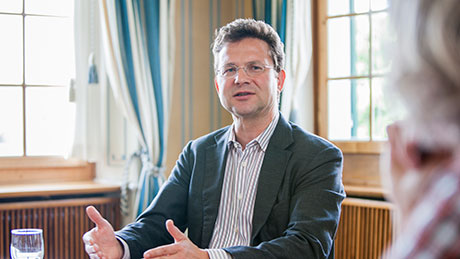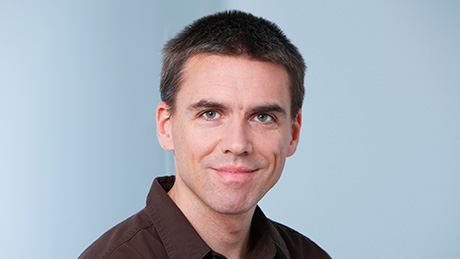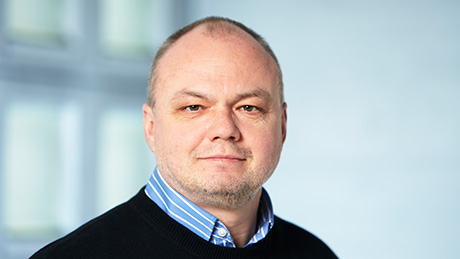Navigation auf uzh.ch
Navigation auf uzh.ch

Niko Beerenwinkel, professor of computational biology at ETH Zurich, is co-director of the Competence Center for Personalized Medicine (CC-PM), together with Holger Moch, professor of surgical pathology at UZH. Beerenwinkel is optimistic: «We are on the brink of a paradigm shift in medicine. The clinical application of personalized medicine is close to becoming reality.» And, Beerenwinkel believes that Zurich offers the best conditions.«To conduct personalized medicine, we need clinical expertise, basic research in biology, and technological innovation. With ETH Zurich, UniversityHospital, and UZH all in close proximity, Zurich has everything it takes.»
With the goal of a ground-breaking innovation in mind, researchers from the University of Zurich and ETH Zurich founded a joint competence center in 2013.This involved opening a new office at the University of Zurich for coordinating the combined efforts of the research groups involved, which themselves remain at their current sites. The office is funded by the University of Zurich and ETH Zurich, each contributing CHF 500'000 for the period from 2014 to 2017.
Many experts believe that personalized medicine is the way of the future. Today there is hardly a single university of international standing that hasn’t founded its own department or research center at the intersection between medicine, biology, and computer science. This is mainly because of the tremendous progress made in DNA sequencing. In 2001, the scientific community celebrated the first-ever sequencing of the human genome, made up of 3.3 billion base pairs – the culmination of an eleven-year, three-billion-dollar project involving over two hundred scientists.
Nowadays, DNA sequencing is a standard procedure in biology, with the analysis of human DNA taking only a few days and costing less than CHF 5,000. This provides a powerful tool for medical professionals and biologists. For example, cancerous tumors are no longer identified by analyzing tissue samples; instead, a detailed description is made of their genetic changes over time. This is of vital importance because, although all humans have essentially the same DNA, the difference is in the detail. The smallest of variations in DNA control the differences in disease progression from person to person.
By measuring the genetic changes in a tumor, as well as the changes to cellular transcriptomes and proteomes, researchers are able to tailor treatment and increase the chances of recovery. Early versions of this personalized medicine have already been used successfully in lung cancer treatment.

Now it is time for the next step: Personalized medicine must find its way into daily clinical practice – an entirely new challenge for researchers and medical professionals: «The amount of data generated for genome sequencing is vast and very difficult to interpret,» explains Beerenwinkel. «In order to draw useful conclusions from this data, dedicated information systems are required, as are new statistical and bioinformatic methods.»
To overcome these challenges, Holger Moch, Professor at the Institute of Surgical Pathology at UZH, and Wilhelm Krek, Professor of Cell Biology at ETH Zurich, established the CC-PM in 2013. In doing so, the existing expertise and resources of the two universities could be pooled and enhanced. «The research groups most heavily involved have already worked together in the past,» says Holger Moch, who directs the CC-PM with Niko Beerenwinkel. «Now we are creating the institutional framework required for this kind of cooperation and paving the way for cross-institutional collaboration in the field of personalized medicine.»
In order to do this, three complementary technology platforms are being created within the CC-PM, with Holger Moch directing the Tissue, Sera and Cell Banking Technology Unit. This group is compiling an archive of well-characterized samples such as cell lines, tissue and sera (blood). Wilhelm Krek is leading the Theragnostics Discovery Unit, whose goal is an improved understanding of molecular disease mechanisms, while Niko Beerenwinkel’s Personalized Medicine ICT Unit is working on new concepts and software for managing and analyzing the newly generated medical data.

Today, personalized medicine has made the most progress in oncology, i.e. the study of cancer. «In two years’ time, we will be able to sequence a large number of tumors even before cancer treatment has begun, and in five years this will be the norm,» predicts Beerenwinkel. Moch believes that, in the future, sufferers of diabetes and multiple sclerosis will also reap the benefits of improved treatment.
There are high hopes pinned on the integration of biologists’ genetic analyses with long-term data from clinical studies. By comparing patient data with thousands or even millions of entries in a database, researchers would be able to identify correlations between the genetic changes in tumors and patients’ symptoms. Based on the insights gained, treatment can be adapted to individual needs.
However, the security requirements for analyses like these are extremely high. «Complex anonymization processes are needed in order to protect patients' privacy rights,» Beerenwinkel points out. The CC-PM also intends to focus its research on developing such processes.
The CC-PM should also benefit education, as it allows doctoral students to specialize in personalized medicine (Molecular and Translational Biomedicine) right from the start. Programs for Bachelor’s and Master’s students are also planned for the future. Beerenwinkel is convinced that «we need a new generation of clinicians who know how to handle biomedical data.» Moch adds that «even now, medical professionals and bioinformaticians often don’t speak the same language. We need to promote mutual understanding in education.»